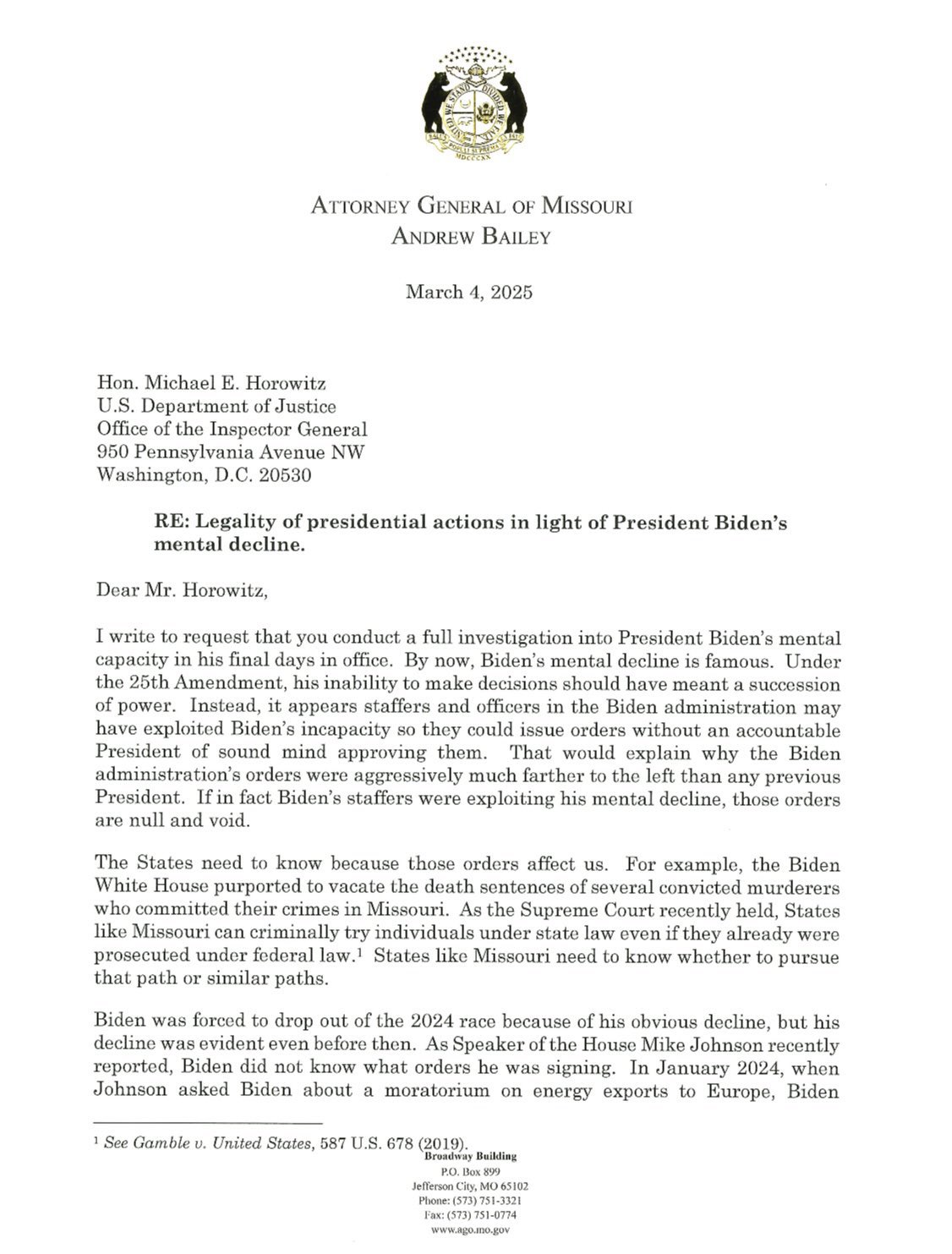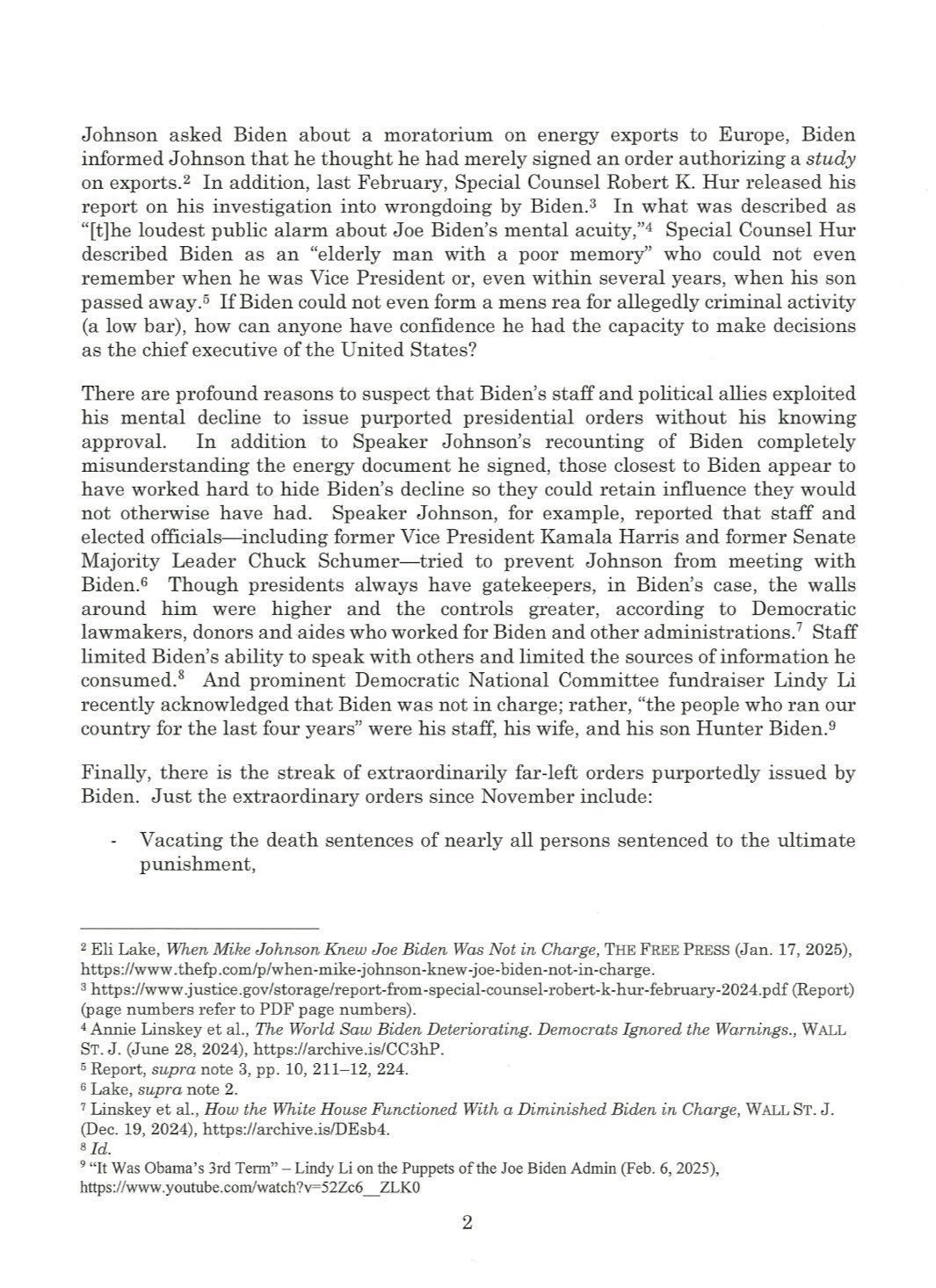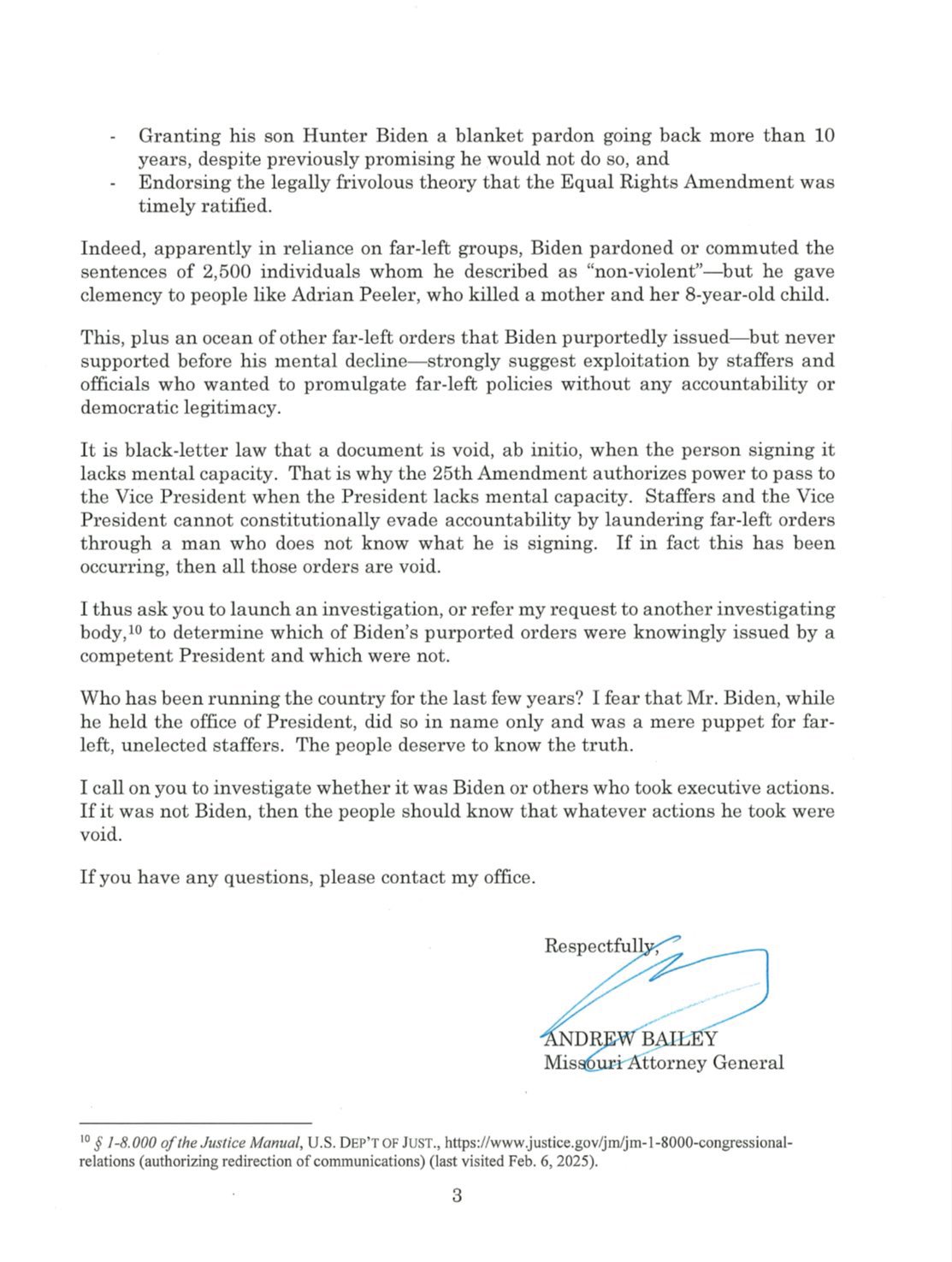You are using an out of date browser. It may not display this or other websites correctly.
You should upgrade or use an alternative browser.
You should upgrade or use an alternative browser.
Republican Operatives
- Thread starter GURPS
- Start date
BREAKING: Missouri Attorney General Andrew Bailey asked the DOJ to investigate whether Biden’s cognitive mental decline allowed unelected officials to make decisions without his knowledge or approval.
If that’s the case, Biden’s executive orders, pardons, and other actions, may be unconstitutional and void.



JUST IN: Rep. Marjorie Taylor Greene announced she and the DOGE committee sent a letter to AG Bondi and FBI Director Patel to launch an investigation into the attacks on Tesla showrooms
Trump said he’ll be labeling them as “DOMESTIC TERRORlSTS,” so they should be treated as such.
This crap HAS to end. Make an example out of them and it’ll stop.
PJay
Well-Known Member
SMITH-MUNDT ACT: THE LAW THAT ONCE BANNED U.S. GOVERNMENT PROPAGANDA—AND WHY IT MUST BE RESTORED The Smith-Mundt Act of 1948 was created to prevent the U.S. government from using taxpayer dollars to spread propaganda inside the United States. It allowed foreign-facing public diplomacy, like Voice of America (VOA), but made sure the government could not target Americans with state-controlled media. That all changed in 2013, when Obama overturned key protections in the law, allowing federal agencies to produce and distribute propaganda directly to U.S. citizens—something that had been illegal for decades. Now, taxpayer-funded media and government-run narratives are pushed on the American public with no safeguards, no oversight, and no accountability. Restoring the Smith-Mundt Act would: - Ban the U.S. government from funding propaganda aimed at Americans - Shut down government-run media manipulation - Ensure taxpayer dollars aren’t used to control public opinion Source: USA GM
Rep. James Comer and FBI to Bring CRIMINAL CHARGES Against ActBlue Operatives in Largest Money Laundering Scheme in U.S. History
“We’re investigating ActBlue the same way we investigated the Bidens,” Comer said. “We’re starting with the suspicious activity reports—bank violations that flag financial crimes. And let me tell you, the evidence is overwhelming.”
As Comer’s investigation progresses, chaos is unfolding inside ActBlue. Key executives are resigning. Lawyers are jumping ship. Employees are getting locked out of their computers, sending frantic messages about whistleblowers.
Benny Johnson, conservative commentator and host, nailed the urgency of the situation: “When the lawyers flee, you know you’re cooked.”
Comer confirmed the exodus: “These people know what’s coming. If ActBlue was innocent, they’d be out there defending themselves, calling me a conspiracy theorist. Instead, they’re running for the hills.”
Newt's Warning: Jefferson's Blueprint Against Judicial Dictatorship
In a rare burst of historical insight, former House Speaker Newt Gingrich recently urged Americans frustrated by activist judges to recall the Judiciary Act of 1802, when Thomas Jefferson decisively countered judicial overreach. Gingrich's invocation is not mere historical nostalgia—it holds genuine implications for today’s judiciary, whose activism increasingly encroaches upon executive prerogatives.
As a high school student in 1988, I had the unique opportunity to work on Newt Gingrich’s congressional campaign, long before his eventual elevation to Speaker of the House. Gingrich, then transitioning from his role as a respected history professor at the University of West Georgia to elected office, demonstrated an exceptional ability to integrate historical lessons into practical political strategy. Observing firsthand Gingrich’s intellectual rigor and historical acumen, my respect and admiration deepened profoundly, shaping my conservative outlook significantly. His recent invocation of Jefferson is reflective of precisely this intellectual acumen and historical clarity that I first encountered decades ago.
The historical context Gingrich references dates to the tumultuous transition from President John Adams to President Thomas Jefferson in 1801. Adams, anticipating electoral defeat, sought to entrench Federalist influence through a series of judicial appointments under the Judiciary Act of 1801—appointments derisively called the "Midnight Judges." Jefferson and his Democratic-Republican Party recognized this move as an affront to democratic governance, a partisan manipulation intended to subvert the clear will of the electorate.
Jefferson responded swiftly, employing the Judiciary Act of 1802 to eliminate Adams's newly established judgeships, an act of significant constitutional boldness. His congressional allies dismantled the freshly minted judicial structure, effectively unseating the Federalist appointees. Critics cried foul, claiming this compromised judicial independence, yet Jefferson discerned what others failed to appreciate: judicial independence does not grant judicial supremacy. Jefferson's decisive action underscored the fundamental principle that courts should interpret law, not supersede democratic governance.
Today, a parallel tension emerges as district court judges regularly issue nationwide injunctions against executive actions—decisions that resonate far beyond their immediate jurisdiction. During President Trump’s administration, judges in Hawaii, California, and New York imposed nationwide injunctions blocking policies from immigration restrictions (the so-called "travel ban") to military personnel decisions and sanctuary city funding limitations. Such sweeping orders extended local judicial power into national policy-making, sparking charges of judicial activism and raising concerns reminiscent of Jefferson’s own.
The judicial obstruction of executive actions continued even under President Biden, when a Texas district judge imposed a nationwide injunction halting a moratorium on deportations. These cases illustrate a troubling pattern where single district judges assume the role of national policymakers, often reflecting ideological stances rather than strict constitutional interpretation.
Critics of judicial overreach argue convincingly that such injunctions represent a distortion of the judiciary's intended role. James Madison himself warned against judicial authorities becoming ultimate policy arbiters, a sentiment echoed forcefully by Jefferson, who cautioned against judicial oligarchy undermining democratic governance. Today’s unchecked nationwide injunctions fulfill Madison’s and Jefferson’s fears by placing unelected judges atop the hierarchy of policymaking power, effectively vetoing democratically enacted executive decisions.
Gingrich’s invocation of Jefferson’s response suggests not only historical insight but actionable guidance. Congress possesses clear constitutional authority to structure, and if needed restructure, the judiciary. Such power need not replicate Jefferson's drastic abolition of courts but could employ measured procedural reforms. Senator Mike Lee’s proposal, requiring multi-judge panels for nationwide injunctions, presents one such modern, restrained remedy. These procedural guardrails prevent a single judge’s preferences from overshadowing national policy, preserving judicial legitimacy without sacrificing independence.
Opponents might label this approach a threat to judicial independence, but historical experience refutes this claim. Jefferson's judiciary restructuring, while controversial, ultimately reinforced the necessary boundaries around judicial power. The Supreme Court’s cautious affirmation of the 1802 reforms demonstrates that restructuring courts, if done judiciously, aligns fully with constitutional principles.
Gingrich's invocation is thus more than a historical footnote; it is a call for constitutional recalibration. Judges must confine themselves to interpreting law rather than creating policy. The Judiciary Act of 1802 stands today not merely as a relic but as a guidebook for contemporary reform. Jefferson's lesson reminds us that the republic thrives when each branch operates within its constitutional confines. As Congress considers how best to respond to the contemporary judiciary's overreach, Jefferson’s lesson, echoed now by Gingrich, merits earnest attention. The republic’s enduring strength depends not on unchecked judicial authority but on a vigilant, balanced interplay among co-equal branches of government.
In a rare burst of historical insight, former House Speaker Newt Gingrich recently urged Americans frustrated by activist judges to recall the Judiciary Act of 1802, when Thomas Jefferson decisively countered judicial overreach. Gingrich's invocation is not mere historical nostalgia—it holds genuine implications for today’s judiciary, whose activism increasingly encroaches upon executive prerogatives.
As a high school student in 1988, I had the unique opportunity to work on Newt Gingrich’s congressional campaign, long before his eventual elevation to Speaker of the House. Gingrich, then transitioning from his role as a respected history professor at the University of West Georgia to elected office, demonstrated an exceptional ability to integrate historical lessons into practical political strategy. Observing firsthand Gingrich’s intellectual rigor and historical acumen, my respect and admiration deepened profoundly, shaping my conservative outlook significantly. His recent invocation of Jefferson is reflective of precisely this intellectual acumen and historical clarity that I first encountered decades ago.
The historical context Gingrich references dates to the tumultuous transition from President John Adams to President Thomas Jefferson in 1801. Adams, anticipating electoral defeat, sought to entrench Federalist influence through a series of judicial appointments under the Judiciary Act of 1801—appointments derisively called the "Midnight Judges." Jefferson and his Democratic-Republican Party recognized this move as an affront to democratic governance, a partisan manipulation intended to subvert the clear will of the electorate.
Jefferson responded swiftly, employing the Judiciary Act of 1802 to eliminate Adams's newly established judgeships, an act of significant constitutional boldness. His congressional allies dismantled the freshly minted judicial structure, effectively unseating the Federalist appointees. Critics cried foul, claiming this compromised judicial independence, yet Jefferson discerned what others failed to appreciate: judicial independence does not grant judicial supremacy. Jefferson's decisive action underscored the fundamental principle that courts should interpret law, not supersede democratic governance.
Today, a parallel tension emerges as district court judges regularly issue nationwide injunctions against executive actions—decisions that resonate far beyond their immediate jurisdiction. During President Trump’s administration, judges in Hawaii, California, and New York imposed nationwide injunctions blocking policies from immigration restrictions (the so-called "travel ban") to military personnel decisions and sanctuary city funding limitations. Such sweeping orders extended local judicial power into national policy-making, sparking charges of judicial activism and raising concerns reminiscent of Jefferson’s own.
The judicial obstruction of executive actions continued even under President Biden, when a Texas district judge imposed a nationwide injunction halting a moratorium on deportations. These cases illustrate a troubling pattern where single district judges assume the role of national policymakers, often reflecting ideological stances rather than strict constitutional interpretation.
Critics of judicial overreach argue convincingly that such injunctions represent a distortion of the judiciary's intended role. James Madison himself warned against judicial authorities becoming ultimate policy arbiters, a sentiment echoed forcefully by Jefferson, who cautioned against judicial oligarchy undermining democratic governance. Today’s unchecked nationwide injunctions fulfill Madison’s and Jefferson’s fears by placing unelected judges atop the hierarchy of policymaking power, effectively vetoing democratically enacted executive decisions.
Gingrich’s invocation of Jefferson’s response suggests not only historical insight but actionable guidance. Congress possesses clear constitutional authority to structure, and if needed restructure, the judiciary. Such power need not replicate Jefferson's drastic abolition of courts but could employ measured procedural reforms. Senator Mike Lee’s proposal, requiring multi-judge panels for nationwide injunctions, presents one such modern, restrained remedy. These procedural guardrails prevent a single judge’s preferences from overshadowing national policy, preserving judicial legitimacy without sacrificing independence.
Opponents might label this approach a threat to judicial independence, but historical experience refutes this claim. Jefferson's judiciary restructuring, while controversial, ultimately reinforced the necessary boundaries around judicial power. The Supreme Court’s cautious affirmation of the 1802 reforms demonstrates that restructuring courts, if done judiciously, aligns fully with constitutional principles.
Gingrich's invocation is thus more than a historical footnote; it is a call for constitutional recalibration. Judges must confine themselves to interpreting law rather than creating policy. The Judiciary Act of 1802 stands today not merely as a relic but as a guidebook for contemporary reform. Jefferson's lesson reminds us that the republic thrives when each branch operates within its constitutional confines. As Congress considers how best to respond to the contemporary judiciary's overreach, Jefferson’s lesson, echoed now by Gingrich, merits earnest attention. The republic’s enduring strength depends not on unchecked judicial authority but on a vigilant, balanced interplay among co-equal branches of government.
Don Bacon is being taking to task for his poor optics response ... what a dick



I don't know anything about Beard Vet and Don Bacon, but damn... DR sure called out Dan Crenshaw,
I don't know anything about Beard Vet and Don Bacon, but damn... DR sure called out Dan Crenshaw,
I only know about Beard Vet because he has been Swatted .... and I agree Don Bacon is being a disingenuous dick
So you could rack it up as Twitter Drama and the dude is NOT your Congress Critter and ignore it, but this shows the Character of Bacon, so to me this matters on some level

